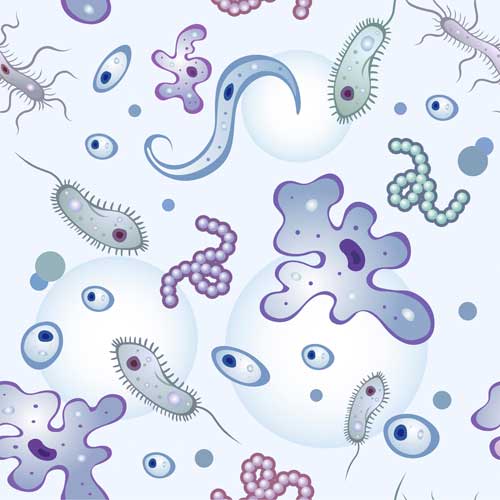
When I was in school I learned that there were two different kinds of bacteria, the nasty ones (pathogens) that could make you sick and the nice ones (commensals), which simply colonized you and did nothing much except occupy a spot that could otherwise be taken up by a pathogen. Any role for those commensal bacteria in health and disease was assumed to be no more than that of a harmless squatter. In recent years, studies of this benign microbial population (microbiome studies) have begun to reveal many more intriguing details about how they affect our health and wellbeing. Maybe it’s not so surprising that “good” bacteria could be good for our health—but could they actually affect how we behave? A review in Science summarized findings that indicate that this is indeed the case—at least for certain animal populations. Could it be true for humans as well? Could our colonizing organisms actually influence how we feel and what we do?
The human body is host to vast numbers of colonizing bacteria. Our bacterial cells outnumber our human cells by a factor of 10 to one, and collectively weigh 2-3 pounds. Up until recently, most of our knowledge of the relationship between humans and bacteria was based on studies of bacteria that cause disease. Now, studies on the “normal” bacteria that colonize our skin, large intestine and mucous membranes suggest that they not only play an active role in keeping us healthy, but may be as individual as fingerprints, and may even affect our emotional state or anxiety level.
Microbiome studies have suggested that colonizing microbial populations have a role to play in susceptibility to a range of diseases including heart disease, obesity, and colon cancer (see an earlier blog on this topic). Studies published in 2011 suggested that differences in susceptibility to heart disease may be associated with the presence/absence of the microbial populations capable of converting lipids from fatty foods into harmful metabolites, and showed that in mice the presence of particular bacterial populations in the gut could cause obesity. Maybe the idea that gut bacterial populations influence processing of metabolites, and that certain populations may be more favorable than others, is not such a big surprise. But the idea that disease risk could be altered by changing the species colonizing the gut certainly raises interesting possibilities for health management, and makes me a bit less skeptical than I used to be about anything labeled “probiotic”.
But what if behavior were influenced, in part, by colonizing bacteria? The review by Ezenwa et al in the Oct 12 issue of Science describes how the microbiome influences behavior in several different species. For example, fruit flies (Drosophila melanogaster) prefer to mate with individuals who share the same diet, a preference that is abolished by antibiotic treatment and restored by injecting flies with microbes from the fly food. And then there is the mosquito, Anopheles gambiae, which is attracted to people with less microbial diversity on their skin, and is repelled (or less attracted to) skin with a high abundance of Pseudomonas or Variovorax species. The suggestion is that these bacteria either produce chemicals that repel mosquitoes, or that they mask the “attractive” chemical signals from the person they colonize. Some of the other examples in the article are more familiar cases of classic symbiotic relationships in the animal kingdom, such as the relationship between the bobtail squid and its bioluminescent symbiont Vibrio fischeri , or the bumble bees that ingest beneficial microbes to gain protection from a parasite.
To me, the most amazing studies outlined in the review were those of Bravo et al and Diaz et al, published in PNAS in 2011. These studies showed that, in mice, changes in the gut microbiome can influence anxiety and stress-related behavior. The presence of Lactobacillus rhamnosus in the diet of these mice appeared to protect them from anxiety in a stressed situation—an effect thought to be the result of communication between the bacterial products in the gut and the brain via stimulation of the vagus nerve. Of course these studies were performed in mice and may not translate to anything relevant in humans. However, the possibility that metabolites from bacteria in the gut could affect something as personal to us as our anxiety level is a radical idea that, if true, puts these commensal organisms in a whole new light.
I wonder if Greek yogurt contains L. rhamnosus? Perhaps I’ll do my own experiment in preparation for my next stressful situation. On the other hand, what will be my control? And what if my husband subconciously chose me because of my microbiome?? Am I risking my marriage with my yogurt choices?
Here is the paper
Ezenwa VO, Gerardo NM, Inouye DW, Medina M, & Xavier JB (2012). Microbiology. Animal behavior and the microbiome. Science (New York, N.Y.), 338 (6104), 198-9 PMID: 23066064
Additional References:
- Cryan, J.F., and O’Mahony S.M. (2011) The microbiome-gut-brain axis: from bowel to behavior. Neurogastroenterol Motil. Mar;23(3):187-92.
- Pennisi, E. (2011) Girth and the Gut (Bacteria). Science 332, 32-33.
- Bravo, J.A. et al (2011) Ingestion of Lactobacillus strain regulates emotional behavior and central GABA receptor expression in a mouse via the vagus nerve. Proc. Natl. Acad. Sci USA 108, 16050-16055.
- Diaz-Heijtz, R. et al (2011) Normal gut microbiota modulates brain development and behavior. Proc. Natl. Acad. Sci USA 108, 3047-3052.
Isobel Maciver
Latest posts by Isobel Maciver (see all)
- 3D Cell Culture Models: Challenges for Cell-Based Assays - August 12, 2021
- Measuring Changing Metabolism in Cancer Cells - May 4, 2021
- A Quick Method for A Tailing PCR Products - July 8, 2019

Reblogged this on Promega Scientific Training.